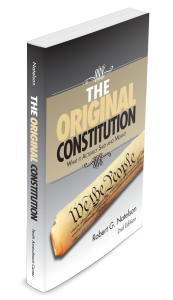The Constitution’s Framers were very great men, but they were not gods. They made mistakes.
By “mistakes,” I’m not talking about matters of political judgment, such as how much to accommodate slavery. I mean drafting errors of the forehead-slapping kind.
Consider first a matter of style: The Constitution in its final form was drafted by a committee chaired by Gouverneur Morris. By all accounts they did a fine job. But not a flawless one.
The committee decided to follow the practice of capitalizing all nouns—a custom already going out of fashion, and abandoned just two years later when the Bill of Rights was written (that is, 1789; the Bill was ratified in 1791). One could defend that decision; but after having made it, they forgot to capitalize several nouns. The omissions include the word “defence” in the Preamble; “credit” in Article I, Section 8, Clause 2 (the congressional borrowing power); “duty” in Article I, Section 9, Clause 1; and “present” in Article I, Section 9, Clause 8.
Much more serious were a handful of substantive mistakes. Article I, Section 7, Clause 3 provides that all congressional resolutions requiring concurrence of the House and Senate must be presented to the President for his signature or veto. The Clause contains no exception for constitutional amendments under Article V—even though the evidence suggests that the Founders intended such an exception. So beginning with the 1798 Supreme Court case of Hollingsworth v. Virginia, the courts have followed the Founders’ intent rather than the literal wording.
Article II is certainly the worst-drafted of the instrument’s seven articles. The very first sentence of Article II (the so-called Executive Vesting Clause) is unclear enough to have led to long-standing disputes over the scope of presidential power—although my own view is that the disputes are due as much to ignorance of 18th century drafting practice as to the quality of the drafting.
Article II specified that the runner-up in the presidential election would be Vice President. I put that in the “misjudgment” rather than the “blooper” category because, as I explain in my book, The Original Constitution: What It Actually Said and Meant, there were some good reasons for the initial rule. It was only in practice that we learned that that approach didn’t work. It was corrected in 1804 by the adoption of the Twelfth Amendment.
But another defect in Article II falls squarely in the “blooper” category. The Framers inserted qualifications in Article I for Senators and Representatives, and when they wrote Article II they prescribed qualifications for the President. But they omitted qualifications for the Vice President. Apparently they just forgot. The Twelfth Amendment cured that omission also.
A less obvious boner appears in Article II, Section 2. One if its phrases implies that, with Senate advice and consent, the President appoints federal officers. But a later phrase in the same section (“may by Law vest the Appointment . . . in the President alone”) implies that the Senate co-appoints. Important consequences depend on which phrase controls, but it takes some serious constitutional interpretation to figure out that the former prevails over the latter. This also is explained in The Original Constitution: What It Actually Said and Meant.
The Bill of Rights—drafted by the First Congress—isn’t free of composition mistakes either. The Fifth Amendment excepts members of the U.S. Armed Forces from the requirement of grand jury indictment, but it fails to except enemy combatants accused of war crimes. If you read it literally, therefore, the Fifth Amendment seems to extend more protection to enemy combatants than to our own soldiers. It takes some interpretative work to figure out that this is not actually so. This point is also discussed in The Original Constitution: What It Actually Said and Meant.
Don’t get me wrong: In its entirety, the Constitution is a beautiful piece of legal craftsmanship. Indeed, most of those who charge the Framers with mistakes are mistaken themselves, either because they are ignorant of 18th century language, history, law, and conditions, or because they merely disagree with the Founders’ ideas of government.
For example, some writers claim that the Framers were too sketchy in describing the Convention for Proposing Amendments in Article V. But thisclaim is based on ignorance of established 18th-century convention procedure.
For discussions of other unfair raps against the Founders, see posts here,here, and here for short essays correcting such claims.
All that having been said, we still must acknowledge that the Framers made an occasional drafting mistake. Their document is the supreme law of the land, and one of the greatest political achievements in human history. But it is not Holy Writ, unchangeable or never to be questioned: The Framers were humble enough to recognize that themselves. That’s one reason they included the Article V amendment procedure.
- The Truth about the Much-Abused Commerce Clause - February 28, 2024
- The Meaning of “Regulate Commerce” to the Constitution’s Ratifiers: An Update - February 7, 2024
- Why It May be Impossible to Disqualify Trump from the Presidency - January 8, 2024

